Here are 16 frequently asked questions about marijuana’s most famous non-intoxicating cannabinoid and industrial cousin.
1. What’s the difference between hemp and CBD?
Cannabis sativa L, a.k.a. “industrial hemp,” is an incredibly versatile and durable plant, making it ideal for the manufacture of rope, canvas, paper, textiles, fuel and plastic. Hemp seeds are frequently used for food and beauty products. Hemp grows tall and thin, like bamboo, and is non-intoxicating, unlike marijuana.
Cannabidiol, or CBD, is extracted from hemp or cannabis to make oil. In the past few years, as the legality of marijuana has evolved, CBD sales skyrocketed by nearly 40%, according to New Frontier Data. This growth is unlikely to slow as word about CBD’s potential healing and medicinal benefits continues to spread.
2. What’s the difference between hemp-derived CBD and cannabis-derived CBD?
Hemp-derived CBD, extracted only from the stalks and stems, contains less than 0.3 percent THC and must be imported into the U.S. The 2014 Farm Bill allowed states to grow hemp as part of university research pilot programs. However, most hemp-derived CBD comes from outside the U.S.
Cannabis-derived CBD is not limited to extraction from the stalks and stems. Other parts of the plant, especially the flowers, can be used to make CBD oil. Cannabis-derived CBD is grown in legal states.
The most meaningful difference between the two are oversight and product quality. Imported CBD oil has little-to-no oversight regarding extraction techniques and is not likely to have undergone any testing. U.S.-grown, cannabis-derived CBD is tightly controlled, monitored and tested for contaminants.
3. Can you smoke hemp?
Hemp is bred to have negligible amounts of THC and a higher ratio of CBD. So you could smoke it. But if getting high is part of the plan, then hemp’s not for you.
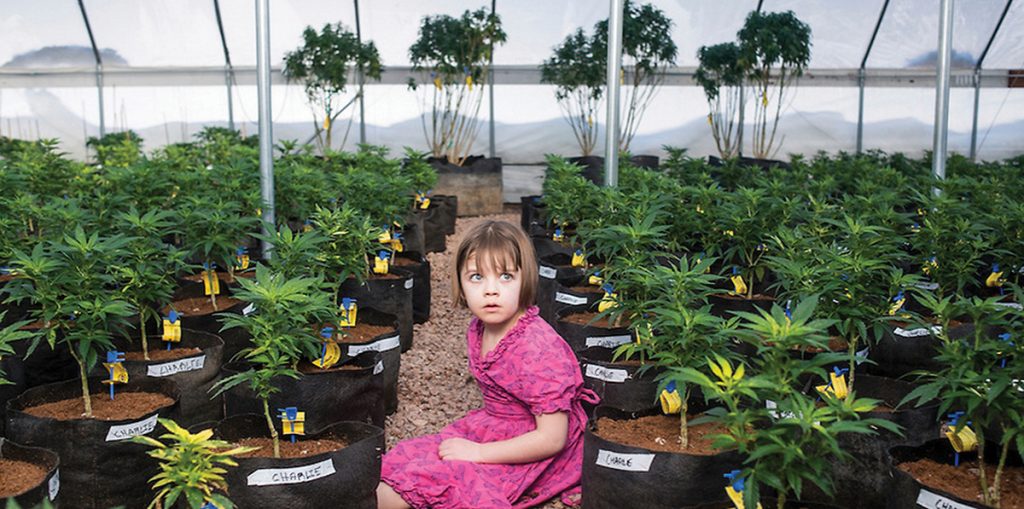
Charlotte Figi
4. What is CBD?
One of the more than 100 chemical compounds present in the cannabis plant, CBD interacts with the body’s endocannabinoid system, which plays a role in regulating physiology and mood. CBD burst onto the scene in 2013 when a young Colorado Springs girl named Charlotte Figi caught the attention of Dr. Sanjay Gupta while filming the CNN documentary, Weed. Figi, who suffers from Dravet syndrome, was having up to 300 seizures a week until her parents started treating her with a high-CBD strain now named for her, Charlotte’s Web.
5. What’s the difference between THC and CBD?
The obvious and visible difference between THC and CBD is that THC can get you high, while CBD cannot. Both are known to have healing properties, but high amounts of THC are less likely to be tolerated by patients, while CBD is known to be tolerable even at high doses. Side effects from CBD are not widely reported, but when they do occur, they’re believed to generate from interaction with other drugs. THC has side effects that are well-known but temporary, like dry mouth, red eyes, sore throat and increased heart rate.
6. Which cannabis strains are highest in CBD?
According to lab data posted by Leafly, the Dancehall strain, with a CBD:THC ratio of 20:1, ranks first. Other high CBD strains include ACDC (19:1), Ringo’s Gift (19:1), Remedy (17:1), Suzy Q (17:1) and Sour Tsunami (15:1). Other strains with high, or balanced, ratios of CBD to THC are Atlant, Avidekel, Candida, Cannatonic, Charlotte’s Web, Dance World, Dinamed, Good Medicine, Harlequin, Hawaiian Dream and Nordle.
7. What are the medical benefits of CBD?
Studies have shown that CBD plays an important role in the treatment of many conditions, most notably, epilepsy. In fact, the FDA recently approved Epidiolex , a CBD oil for Dravet syndrome and Lennox-Gastaut syndrome, another rare kind of epilepsy.
A 2012 study suggested that CBD can be used for pain management. Many professikonal athletes say it helps them recover from injuries and manage chronic pain and inflammation. Other studies have shown that CBD acts as a neuroprotectant (to shield the brain and nervous system).
CBD also interacts in profound ways with cancer cells and may even cause cancer cell death. Other medicinal benefits of CBD include easing symptoms of anxiety and insomnia and as a potential treatment for fighting opioid addiction.
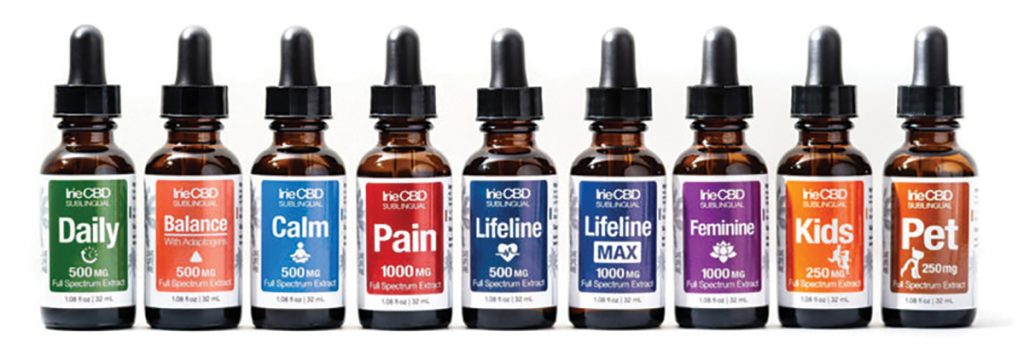
Irie CBD tinctures
8. What’s the best way to use CBD—smoke, vape, eat, tincture, topical?
Most people consume CBD by vaping or as a pill, capsule or tincture. Others may dab it or add it to their food as an isolate. To relieve aches and pains, many use CBD topicals, like a cream or salve. You can also smoke the flower.
9. Is CBD legal?
Even though it seems like CBD is popping up everywhere, the short answer is no, CBD is not federally legal. Fourteen U.S. states have enacted laws that laws that allow for its limited use. But, for the most part, it sits in a legal grey area. If the product contains even a trace amount of THC, it’s considered an illegal substance and may not enter the U.S. stream of commerce. As for U.S. farmers who are growing hemp as part of pilot programs or in legal states, CBD sales are essentially tolerated and lightly enforced. But if you ask the DEA, the Department of Justice and the FDA, CBD is a controlled substance.
However, Epidiolex, mentioned in question 7, was given Schedule V status (“lower potential for abuse”) under the Controlled Substances Act (CSA) by the DEA in September. All other CBD formulas remain in Schedule I (“no currently accepted medical use and a high potential for abuse”), despite extracts being given a new code in 2016.
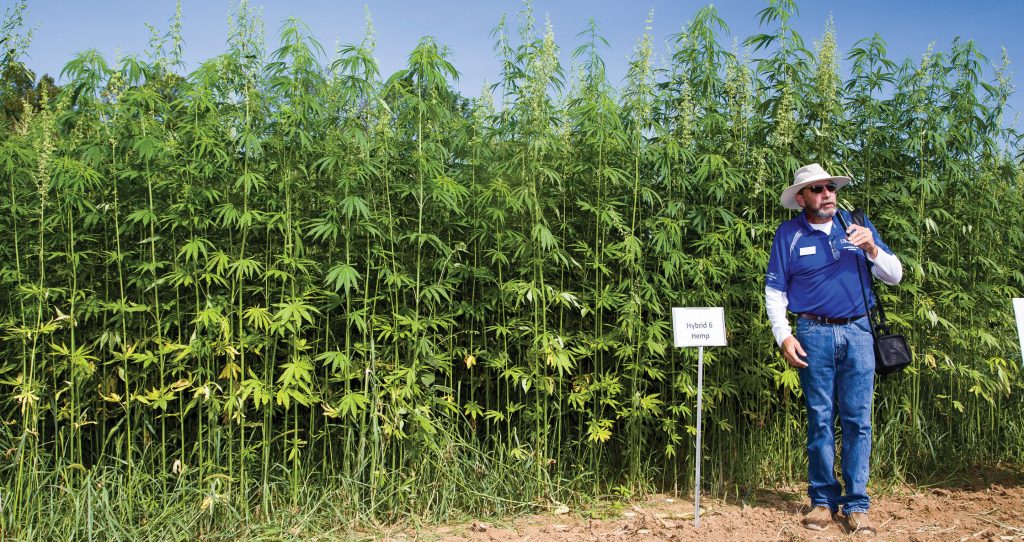
Industrial hemp farm at University of Kentucky College of Agriculture, Food and Environment’s Spindletop Research Farm in Lexington
10. Is hemp legal?
Hemp has been illegal since the Marijuana Tax Act of 1937, when it got ensnared in the same legal net as marijuana, making it a Schedule I drug. Things have changed somewhat for the better since President Obama signed the 2014 Farm Bill. Now, 41 states have authorized hemp production. However, the disconnect between state and federal laws remains a barrier because the U.S. government continues to assert that hemp and marijuana are legally identical. This puts farmers at risk of prison, asset forfeiture or DEA raids.
11. What are some of the products that can be made with hemp?
Hemp can be made into hundreds of products, such as paper, rope and textiles for clothing. High-end car companies like BMW and Mercedes are utilizing hemp-based composites and plastics, while more companies in the food and beauty sectors are adding hemp to their products. There have been exciting developments in plastics, biodiesel and hemp nanomaterials, which could one day replace environmentally devastating batteries in cell phones and hybrid automobiles.
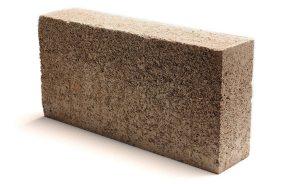
Hempcrete
12. Can hemp be used to build houses?
Yes! Hempcrete—a mixture of hemp, lime and water—is thought to be more thermal resistant than concrete, as well as more energy efficient. Building with hemp is an environmentally friendly alternative, making the home much less toxic, fire resistant and more able to withstand mold, insects and fire.
13. Where is hemp grown around the world?
Industrial hemp crops span the globe, but the top producer is China, where hemp has been growing continually for thousands of years, followed closely by France and Canada.
14. How will the 2018 Farm Bill affect hemp’s legality?
Passage of the 2018 Farm Bill would be a game changer for the U.S. hemp industry. Introduced last spring by Senate Majority Leader Mitch McConnell, the new law would remove hemp from the CSA and legalize it as an agricultural commodity. On September 30, Congress allowed the 2014 Farm Bill to expire. On November 29, the Senate Agriculture Committee agreed to the above provisions. The bill still needs to be voted on by the full Senate.
15. Are hemp food and household products legal?
Yes, but only if the products contain imported hemp seed or hemp seed oil and has less than 0.3 THC. Two exemplary companies in this space are soap maker Dr. Bronner’s, which annually imports 20 tons of hemp seed oil from Canada, and The Body Shop, with its bestselling line of hemp seed, oil-based lotions, from French-grown plants.
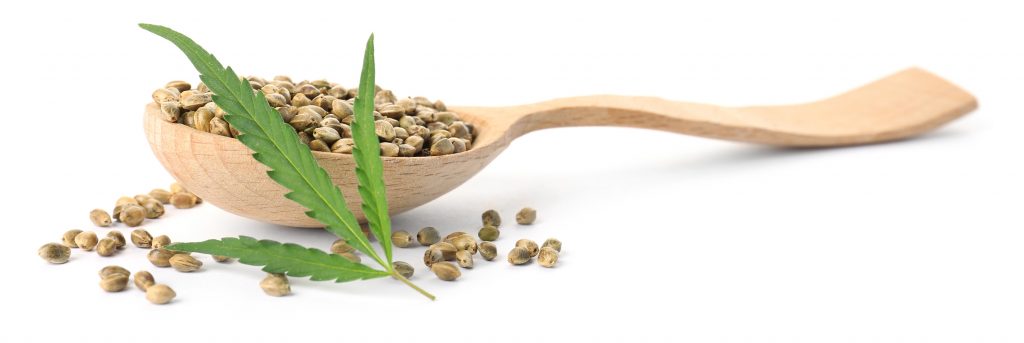
Nutritious hemp seeds
16. What are the nutritional benefits of hemp seeds?
Non-psychoactive hemp seeds, or hearts, have been a nutritional powerhouse for thousands of years because they’re high in polyunsaturated fatty acids like linoleic acid (omega-6), alpha-linolenic acid (omega-3) and gamma-linolenic acid (GLA), and other nutrients.
Polyunsaturated fats are believed to help reduce bad cholesterol levels, which is essential to lowering the risk of heart disease and stroke. These fats also add vitamin E, an important antioxidant that protects the body from cell-damaging free radicals. Since our bodies are unable to produce polyunsaturated fats, hemp seeds can play an important nutritional role in long-term health. Hemp seeds are high in vitamins A and C and beta-carotene, another powerful antioxidant.
Hemp seeds also contain fiber, protein, potassium and iron. Add hemp to your diet by sprinkling shelled seeds on salads or yogurt. Check your local grocery stores for seeds, protein powder, hemp milk, nutrition bars, granola and cold-pressed hemp seed oil. However, cooking with hemp seed oil is not recommended; when heated, it becomes rancid and loses its nutrients. It’s best to keep it cool.
Related Articles
U.S. Chemist Roger Adams Isolated CBD 75 Years Ago
Freedom Leaf Dives into the Hemp-CBD Market
Joy Beckerman: Hemp Industries Association Evangelist
This article appears in Issue 34. Subscribe to the magazine here.
The post Freedom Leaf FAQ: 16 Questions About Hemp and CBD appeared first on Freedom Leaf.
Source: https://www.freedomleaf.com/hemp-cbd-faq/
The blog article Freedom Leaf FAQ: 16 Questions About Hemp and CBD is republished from GigglesNDimples.com
source https://gigglesndimples.com/2018/12/05/freedom-leaf-faq-16-questions-about-hemp-and-cbd/
No comments:
Post a Comment